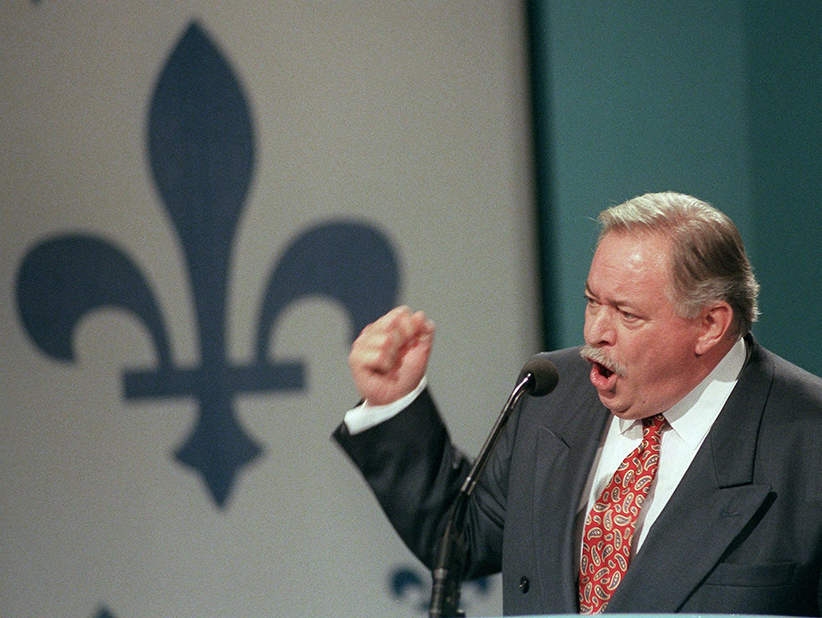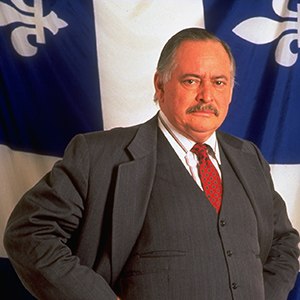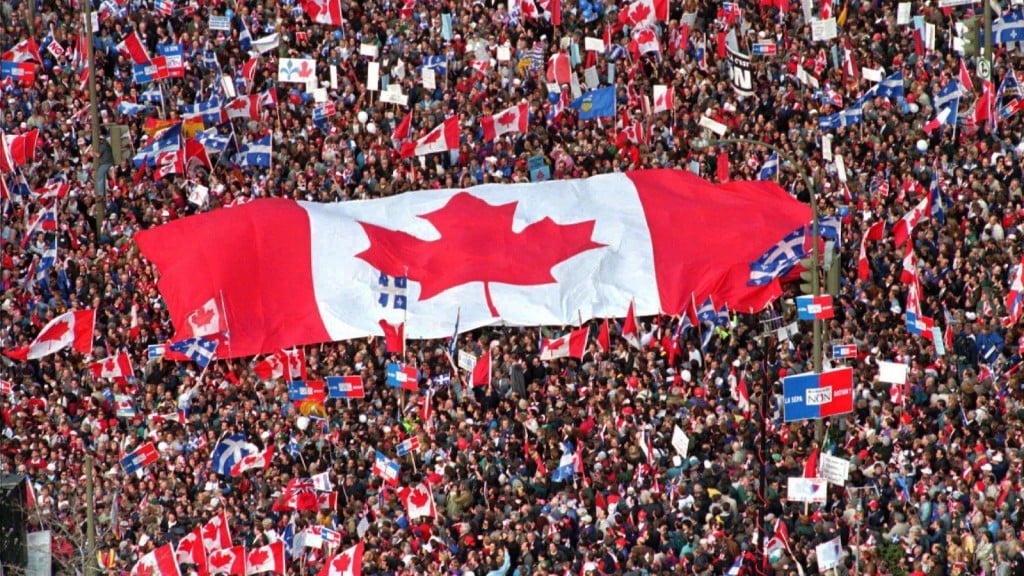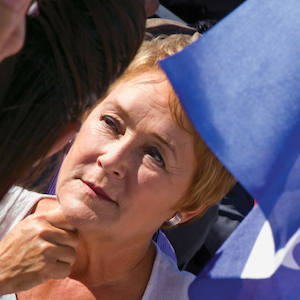Jacques Parizeau: A legacy larger than that speech
Martin Patriquin on the life’s work of Jacques Parizeau, sovereignty’s fierce architect
Share

Jacques Parizeau, a key architect of Quebec’s Quiet Revolution and a pillar of its independence movement, has died at the age of 84. In 1995, just over a year after becoming premier, Parizeau’s Parti Québécois government held a referendum to take Quebec out of Canada. Chances are, you remember Jacques Parizeau for his choice of words after losing. For the record, here is a translation of what he said:
“My friends, it’s failed, but not by much. No, no, no, no. And, in a way, it’s a success. We are . . . hey, please, can we stop talking about the francophones of Quebec? We are going to talk about ‘us,’ and 60 per cent of us voted in favour [of sovereignty].
“We fought well. We fought well and we did succeed in clearly showing what we wanted, and we missed by a tiny margin, a few tens of thousands of voices. In that case, what do we do? We spit in our hands and we start over!
“I really would have liked for it to happen. I so wanted it to happen. We were so close to having a country. Well, it’s pushed back a little bit. Not long. We won’t wait another 15 years this time. No, no, no. What happened was still beautiful, to see in rally after rally the young people who have been told that the future of their country isn’t important, and who became more and more numerous. They said they wanted a country and, as long as the youth think this, we will have our country!
“It’s true, it’s true. It’s true we were beaten—in the end, by what? By money and some ethnic votes, essentially. So it means that, the next time, instead of being 60 or 61 per cent to vote Yes, we will be 63 or 64, and it will happen, that’s it!
“But, my friends, in the months to come, there [will be] people who got so scared that the temptation to avenge will be something indeed. And it will never be so important to have in Quebec City a Parti Québécois government to protect us until the next one!”
Unfairly or not, Parizeau’s five-minute post-referendum spiel stuck to the man more than anything he did or has done since. If you can somehow remove the meaning of his words and just watch the man, the speech he gave was Parizeau at his blustery best. Indignation (and, rumour has it, plenty of booze) stripped him of all his upper-crust snobbery that had so hurt him during the referendum campaign.
His language is smattered with Quebecer joual—”pi” for “and,” and phrases such as, “On crache dans les mains” (we spit in our hands)—more common to construction sites than the classroom of the Collège Stanislas, the private French school he attended. The speech would have been shorter, had the crowd not coaxed him into an off-key verse of Gens du pays, Quebec’s would-be national anthem. It was, arguably, as close to populist as Parizeau ever came; had we seen that version of Parizeau during the campaign, we would probably be writing a very different obituary today.
Ah, but those words. In declaring a cold electoral truth—61 per cent of francophone Quebecers voted for sovereignty—Parizeau undid years of painstakingly slow work on the part of the Parti Québécois to woo visible minorities into the sovereignist camp.
“A nation is judged by how it treats its minorities,” René Lévesque, the PQ’s co-founder, and the province’s premier and secular saint, once said. Soon after taking power in 1976, Lévesque appointed Gérald Godin as minister for cultural communities and immigration. A poet and dreamer more than a politician, Godin took to prose to salute the “uprooted men and women who come to our corner of the globe to earn their piece.” Parizeau’s words wiped out all that goodwill. “It brought us back years with one phrase,” said Jean-François Lisée, who served as Parizeau’s adviser and speechwriter. What’s worse, Parizeau never really apologized. The closest he came was to call his choice of words “unfortunate” (in 2003) and to insinuate he was misunderstood (in 2013).
A sense of Quebec’s possibilities
 Yet, Parizeau’s legacy is far more than the sum of one speech, as ill-timed, boorish and, arguably, xenophobic as it was. Like many Quebecers of a certain age, Lévesque certainly not included, Parizeau was brought up in the weirdly British-inflected French-Canadian bourgeoisie. Although his early educational life was in French, he vacationed at the summer camps of les anglais, dabbled in English culture and, after a séjour at France’s Haute Études Commerciales, he finished his studies at the London School of Economics (LSE). His spoken English, which was worthy of any British diplomat, was indicative of Parizeau’s respect of Mother Britain. He strongly believed in the British parliamentary system, had a taste for Savile Row tailors, and often let out a hearty “by Jove!” when something surprised or delighted him. His respect for Britain seemed to come out of spite, however. “It was the result of a very old and martyred French-Canadian complex. In going to London, he tried to obtain a sort of psychological revenge. His degree from a rarefied British university liberated him from his inferiority complex. It was a way to compensate,” said his friend Jean-Jacques Thernyck, quoted in Pierre Duchesne’s exhaustive three-volume biography of Parizeau.
Yet, Parizeau’s legacy is far more than the sum of one speech, as ill-timed, boorish and, arguably, xenophobic as it was. Like many Quebecers of a certain age, Lévesque certainly not included, Parizeau was brought up in the weirdly British-inflected French-Canadian bourgeoisie. Although his early educational life was in French, he vacationed at the summer camps of les anglais, dabbled in English culture and, after a séjour at France’s Haute Études Commerciales, he finished his studies at the London School of Economics (LSE). His spoken English, which was worthy of any British diplomat, was indicative of Parizeau’s respect of Mother Britain. He strongly believed in the British parliamentary system, had a taste for Savile Row tailors, and often let out a hearty “by Jove!” when something surprised or delighted him. His respect for Britain seemed to come out of spite, however. “It was the result of a very old and martyred French-Canadian complex. In going to London, he tried to obtain a sort of psychological revenge. His degree from a rarefied British university liberated him from his inferiority complex. It was a way to compensate,” said his friend Jean-Jacques Thernyck, quoted in Pierre Duchesne’s exhaustive three-volume biography of Parizeau.
Parizeau left London with a doctorate from the LSE and a firm belief in the Keynesian economic model. He returned to Quebec where, as always, the economic levers were largely out of the hands of the French-Canadian majority. Its electrical utility outside Montreal, to take but one example, was fed by a patchwork of privately owned power-generation plants owned mostly by English businessmen. In 1961, he joined Jean Lesage’s Liberals and pushed for the nationalization of certain industries, including the provincial electricity grid. Lévesque, as Lesage’s natural resources minister, did just that in 1963.
What emerged from Lesage’s transformative government was an early feeling on the part of its key ministers that Quebec independence was possible. No wonder: In the matter of a short few years, Quebec overthrew the domineering influence of the Catholic Church, created the ministries of natural resources, education and health, as well as a provincial pension plan, along with a civil-service cadre capable of managing it all.
Of course, history has a way of distilling truth into cliché; the tenure of premier Maurice Duplessis was hardly the Grande noirceur (great darkness) that his critics, Parizeau included, made it out to be. As author Vincent Geloso has argued, postwar economic development and education was actually on the uptick when Lesage declared his famous campaign slogan, Maîtres chez nous (“Masters of our own house”), in 1962. Yet, with his tendency to rule by force and to grease election campaigns with wads of cash, not to mention his fervent anti-union stance and embrace of rural Quebec’s austere religiosity, Duplessis made a perfect bogeyman for Quebec’s nascent nationalist movement—especially since his death in 1959 provided a timely bookend to his reign. Après lui, le déluge.
Conversion en route to Banff
Parizeau’s own conversion to Quebec’s independence movement was completed following a three-day train trip from Quebec City to Banff in 1967, where he was scheduled to deliver a paper on Canada’s economy. He spent the three days writing the paper, and came to the conclusion, as he rolled into the Rockies, that Quebec was better off on its own.“We couldn’t go on divesting Ottawa of its powers [and] money,” Parizeau told the CBC’s Terence McKenna in 1995. “We were very successful at doing that. God, we were good. The whole thing was becoming unmanageable. I can’t imagine a Quebec government will ever relinquish to Ottawa the powers Ottawa needs to run this country, so, therefore, we’re going to run it from Quebec City.”
The trite, “Two Solitudes”-esque train-ride tale aside, Parizeau’s statement underscored the nature of his nationalism. It wasn’t based on the sense of historical wrongs done to his people, nor on the charming notion of a French-speaking nation carved from Canada’s Anglo-Saxon monolith. Parizeau had long ridded himself of his inferiority complex and all romantic digressions it might provoke. He was interested in the tangible reality of numbers—and his math added up to the economic necessity of a separate Quebec. Not long after his trip to Banff, he became the first star recruit of René Lévesque’s new Parti Québécois.
Although he accepted the softer “sovereignty association” out of political expediency, Parizeau was also a true indépendantiste—though it became more and more difficult to be labelled as such during and after the October Crisis of 1970. The sovereignty movement had broad appeal in Quebec; the Parti Québécois garnered nearly 25 per cent of the vote in the 1970 provincial election, held barely two years after the formation of the party.
In October 1970, the Front de libération du Québec kidnapped British trade commissioner James Cross and Liberal cabinet minister Pierre Laporte. In the following weeks, some 3,000 Quebecers flooded the Paul Sauvé Arena to show their support for the FLQ. However, support for the group caved after the group’s Chénier cell murdered Laporte; he was reportedly strangled by the crucifix he wore around his neck.
Lévesque despised the group, and made pains to differentiate the FLQ’s thuggish methods from the democratic underpinnings of the Parti Québécois. Parizeau, meanwhile, scrambled to retain the PQ’s membership and regional associations, hemorrhaging as they were as a result of the police and Canadian army crackdown following Laporte’s murder. The province was under virtual martial law, and the nationalist movement risked being forever linked with bombings, kidnappings and murder. “It almost killed the party,” Parizeau told Duchesne.
The PQ rebounded, forming Quebec’s government in 1976 and, with the 1980 referendum, putting the province on the cusp of nationhood. Yet Parizeau was restive and, ultimately, unhappy with the direction of the party. Good governance, Lévesque’s main argument to sell a forever-skittish population on the merits of sovereignty, didn’t at all interest Parizeau; forming a new country did, point final. But, as he told Duchesne, he was a “good soldier,” and went along with Lévesque’s plan.
Setting the stage for referendum

Lest Parizeau be regarded as some sort of wolf among the lambs, it’s important to remember how almost absurdly genteel the unity crisis had become following the spat of FLQ violence. Parizeau’s famous “showdown” with then-finance minister Jean Chrétien was over how to apply a federal sales tax. The so-called “night of the long knives” preceding the signing of the Canadian Constitution—Lévesque had been left out of the negotiations—was in fact a Constitutional squabble dressed up as high treason by way of 1930s-era Nazi Germany lingo.
In some countries (Spain and Ireland come to mind), you needed to be responsible for the spilling of blood to be deemed a nationalist radical. That Parizeau would be considered as such is an indication of both Canada’s positively quaint political climate and the tendency for hyperbole by its politicians and commentators. In Spain, the Basque separatist movement flourished during the ’70s and ’80s, and was responsible for hundreds of deaths. Its leaders where imprisoned. Parizeau, meanwhile, considered resigning over the use of a hyphen in the 1980 referendum question.
Nonetheless, the “radical wing,” as journalist Michel David would later refer to it, took over the party in the wake of 1980’s referendum loss and Lévesque’s subsequent beau risque gambit to get Quebec’s signature on the Constitution. Parizeau resigned in protest, only to come back to lead the PQ in 1988.
Lévesque’s death the previous year had sparked new vigour in the separatist movement. The failure of prime minister Brian Mulroney to sell the rest of the country on granting added powers and special status to Quebec, the Meech Lake Accord, only increased support for the option. The stage was set for the 1995 referendum.
Parizeau is rightly remembered and pilloried for his inopportune post-referendum words about money and immigrants. Often forgotten was how wholly unsuited premier Parizeau was at playing the role of uniter-in-chief to his would-be base of white francophones.
There is an unintentionally hilarious scene in the excellent documentary Breaking Point, in which Parizeau, in full campaign mode, is talking up a group of overalls- and hard-hat-wearing workers at an industrial production plant. Lévesque would have shown up in his dishevelled jacket and tie, barked something patriotic in his endearing joual-inflected French, stabbed the air a few times with his cigarette and had those workers eating out of his hand. Parizeau stood in front of them in a three-piece suit and gamely said that what these men and women did was “art.” They looked like they wanted to beat him senseless.
AWOL in the 11th hour
In the end, Parizeau was forced to retreat on nearly every front. He deferred to his cabinet and Lucien Bouchard on the referendum question; at 39 words, it was still quite a mouthful, though nothing compared to 1980’s 118-word behemoth. (Parizeau needed fewer than 10: “Do you want Quebec to separate from Canada?”) He wanted a referendum in the summer of 1995; he put it off to the end of October, again, at the behest of his cabinet and advisers.
And he practically recused himself from the Yes campaign at its 11th hour, when things were clearly not going his way. It took the fuming intensity of Lucien Bouchard, hastily appointed “chief negotiator,” to ramp up the Yes side’s pride and collective sense of aggrievedness to Lévesque-era levels.
And yet, Parizeau and the Yes side still lost—maddeningly so, by all of 54,288 votes. No wonder he was bitter. He was also wrong, as Lisée has often pointed out: The Yes side, arguably, lost the referendum when the Yes vote in the Quebec City region was unexpectedly soft, not because of the Montreal-based “ethnic vote.”
His legacy as a tried and true indépendantiste has since been mixed. “We spit in our hands and we start over!” he said that fateful night, though, apart from being trotted out for various PQ shindigs, sovereignist soirees and the occasional speech, Parizeau never really did much to push for another referendum. That’s not a knock on the man. Having done more than anyone, Lévesque included, to further the sovereignist cause, even through its near-stillborn periods, Parizeau was certainly entitled to think someone else would take up the fight. Unfortunately for him and the cause, no one really did.
He deserved better from his peers and contemporaries and, like several of his fellow ex-PQ premiers, Parizeau didn’t often miss an opportunity to remind whomever happened to be leading the Parti Québécois of the party’s raison d’être.
He publicly pilloried his successor, Lucien Bouchard, when the latter said he needed “winning conditions” to hold another referendum. In 2001, he wrote a 15-page letter to Bernard Landry critiquing the then-premier’s referendum strategy. In 2006, he said the PQ program under then-leader André Boisclair was full of “crap.”
Pauline Marois, who led the PQ to its worst historical showing in terms of popular vote, didn’t fare any better. Yet, in her case, Parizeau’s criticism wasn’t entirely expected. In August 2013, the Marois government announced its so-called “charter of Quebec values” that would prohibit the wearing of “conspicuous” religious symbols. As a crass, cynical and purely political piece of legislation targeting the “ethnic vote,” you’d think the former premier would have been all for it.
He wasn’t. Instead, Parizeau undressed it exactly for the crass, cynical and purely political exercise that it was.
From an open letter he wrote in response to the charter:
“So why do we see such support for the banning of all conspicuous religious articles? I think there is only one explanation: Islam. And it’s understandable. About the only contact most Quebecers have with the Islamic world is the image of violence, repeated ad infinitum: wars, riots, bombs, the bombings of the World Trade Center and the Boston marathon; it’s the image of the subordination of women to man and the violence inflicted on her when she tries to get away from it: We don’t want that chez nous! In Montreal, it’s less the case, we get along. Elsewhere, the reaction is strong. In any case, when the government appears to take measures to limit the so-called ‘extremist invasion,’ the first reflex is to applaud. This isn’t surprising.”
In person and in prose, nuance was never Parizeau’s thing. And yet, it demonstrates the complexity of a man who can so heartily (and heartlessly) blame the “ethnic vote” for his own failures—and then come to the defence of those very ethnic votes some 18 years later. Maybe it was his way of apologizing.
